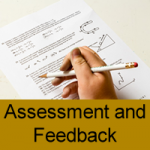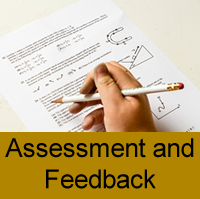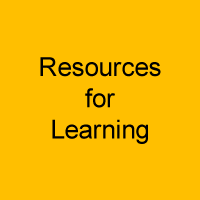CELT offer a range of staff development sessions, all of which are aligned with UDL (Universal Design for Learning). The sessions are organised in four distinct themes. Click on an area of interest below to view a list of sessions that are available to all DMU staff.
Faculty ELT project officers also offer faculty-based sessions, some of which can be delivered to programme/module teams. Contact your Faculty ELT project officer who can advise you further, as well as providing other advice concerning technologies for teaching, learning and assessment.
 Assessment and feedback Assessment and feedbackSessions which exlore the use of technology to implement and enhance assessment and feedback |
| Blackboard Grade Centre
This 90 minute hands on session covers the main features of the Blackboard Grade Centre. Participants will work with columns that have been generated by the more commonly used assessment tools and columns that have been created manually to enable electronic feedback and grades to be administered. Participants will learn how the Weighted Total column can be used to provide indicative grades and how to deal with unwanted columns that may have been copied into the Blackboard shell from previous years.
Blackboard Tests and Surveys Online tests and surveys can enable both formative and summative assessment opportunities that can be ‘machine marked’ with instant feedback being delivered to students. They can also provide an online platform for administering traditionally paper-based and blended assessment modes. This session will provide an overview of how tests and surveys can be used in Blackboard.
Electronic Feedback in Turnitin This one-hour show and tell session will consider the different modes of providing feedback using TurnItIn’s feedback Studio. Participants will learn how to work with the various tools that are available within TurnItIn and consider the appropriateness of each approach, a blend of approaches, and the other options that are available to colleagues at DMU. This session does not include the use of rubrics and grading forms (electronic marking grids). Session schedule: Introduction to Tii This one-hour show and tell session will firstly cover the creation of a TurnItIn submission link in Blackboard and the settings that need to be considered when creating submission links. The session will show the student submission process and how to work with the Originality report and the electronic feedback tools that are available in TurnItIn’s Feedback Studio. Session schedule: Rubrics and Grading forms in Tii This one-hour show and tell session will demonstrate how to create and work with Rubrics and Grading Forms using TurnItIn’ s Feedback Studio. It will cover the teaching and learning considerations when deployed such tools and the main difference between a Rubric and a Grading Form will be highlighted. Participants will learn how to integrate TurnItIn’s other electronic feedback tools into the Rubric or Grading Form in order to provide structured feedback using a variety of modes. Session schedule: |
| Collaboration and Co-Creation Sessions which exlore the use of technology to implement and enhance collaboration and co-creation |
| Bb Collaborate interactive
This session will provide an opportunity for staff who have some experience of using Blackboard Collaborate to consider how to develop engaging and interactive sessions. This session will offer a range of possible options for developing interactive sessions and provide participants with an opportunity to consider and discuss alternatives. Session schedule: Bb collaborate introduction This session will provide an opportunity for staff new to Collaborate to practice setting up and using the Collaborate virtual classroom. This session will give staff the skills and understanding necessary to deliver their first Collaborate teaching session. Session schedule: Discussion boards and forums The session will explore the different management approaches when using a Discussion Board (forum) with students to help foster a collaborative/collegiate approach to learning online. Participants will learn about online behaviour styles, the benefits and otherwise of various management approaches and how to set up a Discussion Board using the Blackboard and Campus Pack Discussion Board tools. Session schedule: DMU Commons – introduction The DMU Commons is a blogging platform and web space that is available to all staff and students at DMU. Commons users can setup, develop and maintain their own blog or web space which they can use for any purpose relating to their work – be that scholarly, research, areas of interest, projects, personal profiles/portfolios, special interest groups, and many others. See https://our.dmu.ac.uk This session will include: An introduction to the DMU Commons; Examples of its use (current Commons sites); The procedure for registering/activating a DMU Commons account; Hands on activity exploring how to configure a Commons site, add content, and create a navigation structure. Session schedule: DMU Replay – supporting student recordings This one hour show and tell session will cover three scenarios in which students might use the DMU Replay service for recording and sharing multimedia artefacts. The session will cover students submitting multimedia artefacts for assessment, recording practice presentations for formative feedback, and recording video blog or vlog posts to support reflective activities. Session schedule: Interactive Whiteboards This sixty-minute show and tell session will explore four scenarios in which the installed interactive whiteboard might provide opportunities to perform live electronic annotation and provide a platform for student interaction. Session schedule: Social media This session will provide an overview of some key social media tools. Participants will have the opportunity to set up their own profile on a social media platform and to reflect on the way that use of social media could enhance their teaching practice. Session schedule: Voting technology Using technology to interact with students in class can offer both instant formative feedback to the tutor; and help to motivate students to get involved, whilst providing a level playing field where all student voices are heard. This demonstration will cover the pedagogic benefits of engaging with students using different voting technologies in class and a demonstration of TurningPoint and Participoll. Session schedule: Digital footprint This interactive session will explore the meaning and implications of digital footprint. We will examine the different types of data and information we leave behind us online and suggest ways to protect and enhance digital identity in line with our own aims. Session schedule: Using Wikis Session schedule: |
| Resources for Learning Sessions which exlore the use of technology to create learning resources |
| Introduction to Enhancing Learning through Technology (ELT) at DMU
The session will introduce participants to the concept of ELT@DMU and the support provided by the Centre for Enhancing Learning through Technology (CELT) for both staff members and students. Participants will learn about the learning technology ecosystem at DMU, how to obtain support when using technology in the curriculum, and the relevant policies and governance that effect the use of technology in the curriculum. Session schedule: Introduction to the Blackboard VLE (Virtual Learning Environment) This session offers an introduction to the use of Blackboard at DMU and is suitable for those new to DMU or those who would like to refresh their knowledge of Blackboard. Participants will learn about the features and tools available in Blackboard and have the opportunity to apply these to their own learning and teaching contexts. Session schedule: Blackboard – Content creation This session will cover the development of Blackboard module shells. Participants will have the opportunity to use the features and tools available in Blackboard and will be encouraged to reflect on the use of these within their own learning and teaching practice. Session schedule: Blackboard – Learning modules The Blackboard Learning Module is a tool that can be used in any module Content area to create a package of learning resources. Resources can be displayed in a structured manner to focus student engagement with a selected topic or theme and to support a range of pedagogic scenarios, including independent study. Participants will discuss examples and learn how to go about creating their own Learning Modules. They will initiate an outline for a potential Learning Module for their own curriculum. Ideally participants will have prior working knowledge of the range of content types and interactive features in Blackboard. Session schedule: Blackboard – Using digital media Digital media affords the opportunity to enhance teaching and learning via a multi-modal approach; offering multiple ways through which to present and communicate knowledge content; and for students to discover, apprehend, synthesise and re-present knowledge. This session is focussed on the use of digital media in the development of learning resources. Participants will explore how to integrate multimedia (digital images, audio and video) into teaching materials on Blackboard. The session is aimed at participants with little to no experience of using digital multimedia in their teaching practice and will cover: working with digital images; adding audio recordings to Blackboard; adding web-videos such as YouTube; an overview of the Box of Broadcasts resource; and copyright in the use of multimedia. Session schedule: NOTE: This session does not include DMU Replay DMU Replay – Advanced editing This session will provide an overview of the advanced editing tools in DMU Replay. Participants will gain hands-on experience in enhancing their recordings to create different types of resources. Session schedule: DMU Replay – Basic editing This session will provide an overview of the basic editing tools in Replay. Participants will be able to reflect on how they can edit their recordings to create different types of resources. Session schedule: DMU Replay – Equitable alternatives There may be occasions when recording a staff-led session is not appropriate or practical. This hands on session covers the equitable alternatives to recording staff led activity using the DMU Replay software provided in teaching spaces. The session will demonstrate how the DMU Replay system can ingest and share more traditional video files that may have been recorded using faculty loaned equipment or colleagues own equipment in order to meet the DMU Replay policy requirements. Participants will try this for themselves and also explore the potential to enhance their teaching practise by using one of the suggested approaches or an equitable alternative of their own. Session schedule: DMU Replay – Overview This session provides an overview of DMU Replay and the basic skills required to make a recording. This includes: launching the DMU Replay software in a classroom; setting the software to record voice and PowerPoint slides; making recordings available to students. Session schedule: DMU Replay – Recording at your desk This session is designed to provide insight into how to use DMU Replay to create multimedia-based content away from the classroom. Session schedule: Flipped classrooms This session offers an overview of flipped classroom practice and identifies various technologies that facilitate the approach. The session includes a workshop component where participants will consider how they might introduce flipped classroom approaches into their own teaching. Session schedule: ELT for UDL Technologies provide a supporting pillar for enhancing UDL approaches to teaching practice and curriculum design. Used appropriately, they can enrich the flexibility, inclusiveness and accessibility of learning environments. This interactive session explores ideas and authentic case studies of technologies for enhancing UDL, with opportunities to discuss and share practice. There are also some quick tips for accessibility to help ensure technologies do not cause barriers to learning. Ideally participants will be familiar with the main technologies for learning and teaching at DMU. Please see the the CELT and UDL page Mon 3rd September 10am- 11.30am; Fri 3rd October, 10am-11.30am; Monday 5th November, 10am-11.30am.
|
| CELT Create Sessions which explore the creative use of technology to enhance teaching, learning and assessment |
| Introduction to infographics
Infographics provide a quick and accessible way to communicate information, whether you want to explain research findings, complex processes or abstract concepts. This introductory session will introduce you to the key aspects of designing an effective infographic, give you experience in developing your own infographic on paper and provide you with resources and tips for translating your infographic from paper to digital format using PowerPoint. For more on Infographics see P27 – 36 of the PDF in this link:https://www.vitae.ac.uk/vitae-publications/guides-briefings-and-information/vitae-occasional-papers-2016.pdf/view Session schedule: Introduction to lego serious play Lego Serious Play is a methodology enabling participants to gain new perspectives, share knowledge and understand complex issues using exercises with Lego bricks. It is underpinned by Social Constructivist learning theory, and embodies the notion of ‘Thinking with the hands.’ This introductory session will introduce you to the main principles of LSP, give you experience in a number of LSP techniques and allow you to consider possible applications of LSP in your own context. For more on Lego Serious Play see https://writingpad.our.dmu.ac.uk/2017/11/09/adventures-in-legoland/ Session schedule: |




